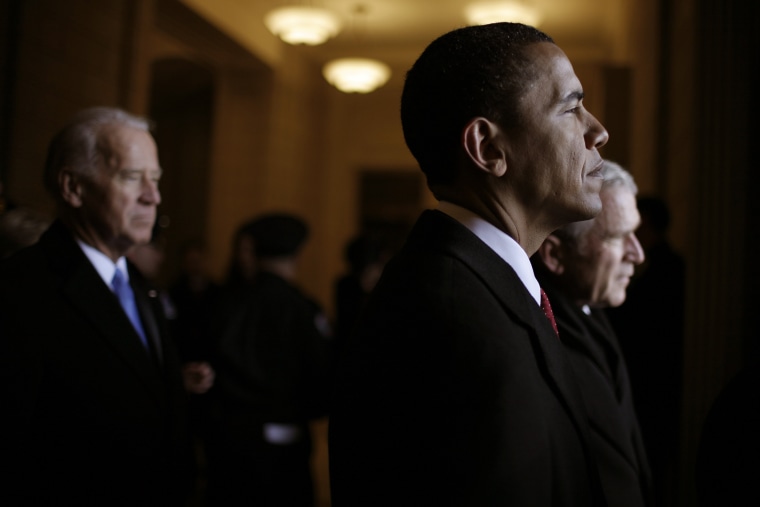Among the many things to be said about the CIA's Bush-era interrogation program, one of the most important is that they got away with it.
That's the crucial background to this week's blowup between the Senate Intelligence Committee and the agency it's meant to oversee. When President Barack Obama ran for office in 2008, he ran on a platform of rebuking his Republican predecessor's national security policies. He inaugurated his first term by denouncing the "false choice" between "our safety and our ideals."
Once in office that choice didn't seem so false--at least not to the president and his advisers. Early on, a handful of terrorist attacks -- some deadly and some comically inept -- were eagerly seized on by Obama's conservative critics, which put the president on the defensive. Obama spent much of the early part of his presidency in a national security debate with former Vice President Dick Cheney, obscuring the reality that he had decided to adopt much of the Bush administration's national security platform -- at least what remained of it after 2006, after the federal courts began reining it in.
When it came to torture, the moral line taken by candidate Obama began to blur. Shortly after the 2008 election, Obama reiterated that "America doesn’t torture, and I’m going to make sure that we don’t torture. Those are part and parcel of an effort to regain America’s moral stature in the world."
One of Obama's first acts was an executive order banning coercive interrogation techinques. But accountability for torture was a whole different matter.
Pledging to "look forward as opposed to looking backwards,” one attempt after another to hold those responsible for the Bush-era torture program faltered.
An early proposal for a kind of "truth and reconcilation comission" was batted away. A Justice Department internal review of the conduct of Bush attorneys, who twisted legal arguments to sanction torture of terrorism suspects, was watered down by a high level DoJ official. Attorney General Eric Holder's probe into interrogations that went beyond even the torture guidelines outlined by Bush administration lawyers ended without any prosecutions. Beyond criminal cases, the administration used its influence to prevent even civil accountability through the courts, by arguing that such lawsuits would expose state secrets.
Bush attorneys associated with the interrogation program have gone on to fulfilling professional lives. Jay Bybee, who signed off on legal memos justifying torture, is a federal judge. Former Cheney counsel David Addington, one of the backers of the theory that the president has "authority to disregard virtually all previously known legal boundaries, if national security demands it," is a vice president at the Heritage Foundation who rails against the tyranny of gun registries. John Yoo, who believes the president could order a child's testicles crushed, is a professor at the University of California-Berkeley and occassionally trolls Obama on the Internet by accusing him of being mad with power for bypassing Congress to appoint heads of federal agencies.
At the CIA, officials associated with the interrogation program were promoted. Those who left, like Jose Rodriguez, wrote memoirs extolling the virtues of waterboarding. When California Senator Dianne Feinstein took the Senate floor to accuse the CIA of violating the law and the Constitution by searching computers being used for the Senate's investigation into the interrogation program, she singled out the acting CIA general counsel Robert Eatinger for referring Senate staff to the Department of Justice for a possible criminal investigation for trying to intimidate her staff.
Eatinger, who allowed Rodriguez to destroy tapes depicting the torture of terror suspects, was named 1600 times in the Senate's report on interrogation, yet was acting as the agency's top lawyer. Even Obama's choice for CIA director, John Brennan -- who is now butting heads with the Senate intelligence committe over its investigation -- was reportedly a supporter of the program at the time.
Ultimately Obama lacked the courage of his convictions. The Republican position was simple -- if coercive interrogations of terror suspects saved lives, then it was worth it. By calling it torture, Obama implied Bush-era interrogation policy had been criminal -- yet not a crime serious enough for anyone to be punished for it. The lack of accountability meant that Republicans' insistence that opposing or supporting torturous interrogations amounted to a mere "policy difference" was essentially proven true.
CIA officials have suggested to reporters that their motivation for searching the Senate staff's computers was alarm that the committee might have acquired information that could compromise the identity of agency sources. But Senate Intelligence Committee chair Dianne Feinstein suggested that the real reason was fear that the Senate had acquired an internal report compiled for then-CIA Director Leon Panetta, that came to the same conclusion that the still-classifed Senate report did: That torture was both brutal and ineffective. The CIA's rebuttal to the Senate report, Feinstein said, was contradicted by that internal review.
The Senate Intelligence Committee's investigation is the closest thing the Bush interrogation program will get to a reckoning, at least for the foreseeable future. Yet after avoiding any criminal, civil, or even professional consequences, it wouldn't be a surprise if the the CIA also believed that they could also escape the ramifications of harshly worded criticism from the Senate.
